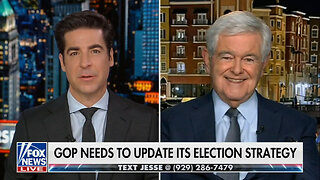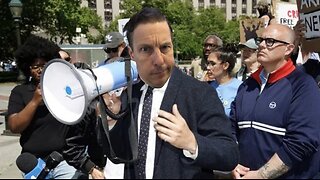Premium Only Content

Donald Trump is Right About Tariffs #economy #news
President Donald J. Trump has been talking a great deal recently about the importance of tariffs, really taking a position very much different from the American position. Starting in World War Two for a very long period of the dominant view in America has been that the lower tariffs, the better, the more international trade, the better. And as a historian, I went back a number of years ago and began to look at these patterns.
It turns out that if you're the dominant country in the world and you have an enormous economic advantage, then you want the biggest possible trade and you want the fewest barriers to trade because you're going to win. However, what happened to the U.S.? Gradually, we got into a habit of using the tariffs and using our economic power to basically build up our political and diplomatic position.
So if we wanted to help a country, we found a way to go to money. The Marshall Plan was the biggest example of that, where we sent billions to Europe in order to help them recover from World War Two and help them survive without becoming part of the Soviet Empire. But we did that across the board, almost everywhere.
The State Department got in the habit of using access to the American market and access to American foreign aid or American contracts or American grants or support of the World Bank and the International Monetary Fund. All of those economic means were used basically to prop up our diplomatic and military position. Well, some time after the fall of the Soviet empire in 1990, that began to be an obsolete position, in particular because we'd undertaken a great gamble.
And let me be quite clear. I was part of that gamble. I favored the North American Free Trade Agreement to help build up Mexico. I favored having a trade with China in the hopes that China would become a more moderate and more democratic, a more open society. The theory was that if they were open to the world economically, they would learn to be open politically.
In both cases, it didn't quite work out. In the case of Mexico, the relative advantages that the Mexican government took. It meant that American manufacturing jobs went south and not much north came north to us. So on balance, we had to renegotiate the agreement that we had with Canada and with Mexico, with China. The situation was very different.
When we first started favoring China economically, encouraging American investment by encouraging the import of Chinese products. Chinese economy was very small and we had reason to believe that the Chinese, in fact, were moving away from communist ism towards a more open, free society. The leader of China, after Mao Zedong was a member of the original Chinese Communist Party named Deng Xiaoping.
Deng Xiaoping made what was called the Southern Tour in the early 1990, and he went around southern China saying that China had to open up economically in order for the Chinese system to survive. And he talked about the idea that you didn't really care whether it was a black cat or a white cat. You cared if the cat was catching mice.
And he was saying to people, Don't tell me about philosophy. Don't tell me about a political theory. Tell me whether or not we can create jobs and we can compete. Well, a lot of us overinterpreted what Deng Xiaoping was saying, and I was one of them. And when Claire Christiansen and I got together to write a book on Trump versus China and I went back and did basic research, I was really surprised to realized that Deng Xiaoping was one of the original 23 founders of the Chinese Communist Party, and he spent a year at Lenin University in Moscow in the 1920s.
And he was totally, completely dedicated to the maintenance of a Stalinist loners dictatorship. And when the students rebelled at Tiananmen Square, Deng Xiaoping took a very hard line position that the government had to use power to suppress all the dissent all across the country, that they could not negotiate. They couldn't look weak. They couldn't back down. And I suddenly realized that we had exactly misinterpreted what Deng Xiaoping was saying.
He wasn't saying, let's become open in order to create jobs as a first step towards becoming an open society. He was saying, let's become open so that we, in fact, are in a good position to sustain the dictatorship by producing enough goods for the Chinese. People will support and tolerate a Chinese communist totalitarian system. The opposite of what we expected.
And that's why I believe that we really have to rethink our position on tariffs. And I think that President Trump is right to demand that we recognize the world as it is. We recognize we're negotiating with predatory countries, and we be prepared to use our tools, including tariffs, in order to negotiate much better deals, much more pro-American deals than we've had up to now.
Order March to the Majority
https://www.amazon.com/gp/product/154600484X?tag=hacboogrosit-20
#news #newtgingrich #tariffs #useconomy #donaldtrump #trade
-
 4:04
4:04
Newt Gingrich
1 year ago $0.20 earnedNewt Gingrich | Fox News Channel's Jesse Watters Primetime | February 19, 2024
760 -
 LIVE
LIVE
LumpyPotatoX2
2 hours agoParty Animals with Creators - #RumbleGaming
186 watching -
 48:46
48:46
Tactical Advisor
3 hours agoMissouri Attorney General Kicked Out of Guncon?! | Vault Room LIve Stream 030
54.5K12 -
 LIVE
LIVE
GamerGril
1 hour agoBingo With☠ Doom Gal☠ | Doom Eternal
101 watching -
 46:39
46:39
Athlete & Artist Show
1 hour agoNHL Draft 2025 Recap w/ Former 1st Round Pick!
1 -
 1:08:04
1:08:04
Jeff Ahern
2 hours ago $1.60 earnedThe Sunday Show with Jeff Ahern
18.3K6 -
 LIVE
LIVE
MissesMaam
1 hour agoParty Animals w/ Cewpins 💚✨
79 watching -
 LIVE
LIVE
ZerrickGaming
2 hours agoPlaying Siege Ranked With @Jorba4 and @JahBlessGames ! Need two more for a full Stack!
75 watching -
 LIVE
LIVE
Biscotti-B23
54 minutes ago🔴 LIVE ELITE RANK PC PLAYER TRIES REMATCH ON PLAYSTATION ⚽ CUSTOMS & RANKED MATCHES
67 watching -
 10:09
10:09
Forrest Galante
9 hours agoWildlife Expert Reacts to Crazy Animal Zoo Attack TikToks
58.2K11